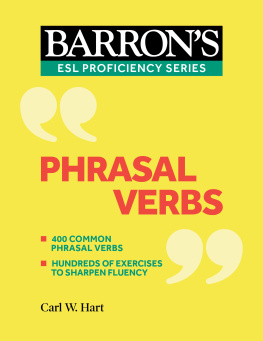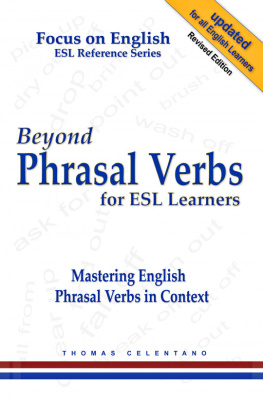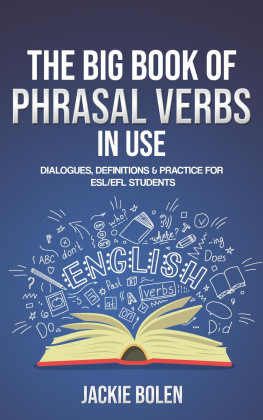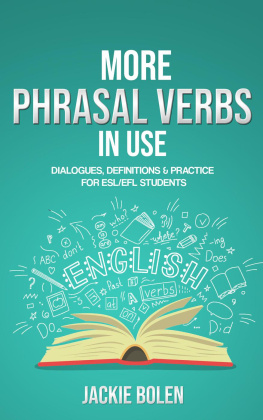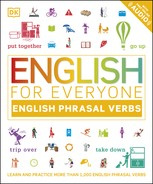Carl W. Hart - Phrasal Verbs
Here you can read online Carl W. Hart - Phrasal Verbs full text of the book (entire story) in english for free. Download pdf and epub, get meaning, cover and reviews about this ebook. year: 2020, publisher: Barrons Educational Series, genre: Detective and thriller. Description of the work, (preface) as well as reviews are available. Best literature library LitArk.com created for fans of good reading and offers a wide selection of genres:
Romance novel
Science fiction
Adventure
Detective
Science
History
Home and family
Prose
Art
Politics
Computer
Non-fiction
Religion
Business
Children
Humor
Choose a favorite category and find really read worthwhile books. Enjoy immersion in the world of imagination, feel the emotions of the characters or learn something new for yourself, make an fascinating discovery.
- Book:Phrasal Verbs
- Author:
- Publisher:Barrons Educational Series
- Genre:
- Year:2020
- Rating:3 / 5
- Favourites:Add to favourites
- Your mark:
- 60
- 1
- 2
- 3
- 4
- 5
Phrasal Verbs: summary, description and annotation
We offer to read an annotation, description, summary or preface (depends on what the author of the book "Phrasal Verbs" wrote himself). If you haven't found the necessary information about the book — write in the comments, we will try to find it.
Phrasal Verbs — read online for free the complete book (whole text) full work
Below is the text of the book, divided by pages. System saving the place of the last page read, allows you to conveniently read the book "Phrasal Verbs" online for free, without having to search again every time where you left off. Put a bookmark, and you can go to the page where you finished reading at any time.
Font size:
Interval:
Bookmark:
What are phrasal verbs? Not everyone agrees on the exact definition, but here is a simplified explanation that will help you as you study Phrasal Verbs.
| separable | inseparable | ||||
| transitive | transitive three-word | intransitive | transitive with optional preposition | transitive three-word | transitive |
| verb + particle | verb + particle + preposition | verb + particle | verb + particle + optional preposition | verb + particle + preposition | verb + preposition |
He put on his shoes. He put his shoes on. He put them on. | He screwed me out of$100. | The students lined up. | She dropped out. She dropped out of school. | I came up with a plan. | She fell for his lies. |
| These are what most people think of when they think of phrasal verbs, but as you can see, there are other types. A small number of separable verb + particle combinations are permanently separated. | A small number of three-word verbs are separable because they must have two objects.  | A preposition is used to make some intransitive phrasal verbs transitive. Then they are like three-word phrasal verbs except that three-word phrasal verbs cannot be used without a prepositionthey have no intransitive meaning. |  |  | |
| Most teachers call these phrasal verbs, but some teachers dont agree that verbs that end with prepositions are phrasal verbs. They call them prepositional verbs. In this book, I call them phrasal verbs. This is not something students should worry about. What is much more important is learning what they mean. | |||||
| Although particles may look like prepositions or adverbs, in phrasal verbs they do not function as prepositions or adverbs, and for that reason, they are called particles. (However, sometimes you will see them called prepositions in other books about phrasal verbs.) | |||||
| Because many phrasal verbs have more than one meaning, many of the phrasal verbs in this book fall into more than one of the categories described above. Also, as you study this book, you will see that there are some variations and exceptions to what I have explained here. Dont worry about trying to remember all this grammar. Please take my advice: meaning is more important than grammar! As you learn what these phrasal verbs mean by reading the examples and doing the exercises, little by little you will learn the grammar too. |
When a verb requires an object, we say the verb is transitive:
I bought a car.
verb object
When a verb does not need an object, we say the verb is intransitive:
His mother died.
verb
Many verbs can be both transitive and intransitive, depending on how they are used:
We ate.
verb
We ate the pizza.
verb object
The verb and particle of some phrasal verbs can be separated by an object. When this is possible, we say that the phrasal verb is separable. When the verb and particle cannot be separated, we say that the phrasal verb is inseparable. Unfortunately, there is no rule that will help you to look at a phrasal verb and always know whether it is separable or inseparable.
When the object of a phrasal verb is a noun, it is (usually) optional whether the object is placed between the verb and the particle or placed after the particle. Both the sentences below are correct:
I took my shoes off.
I took off my shoes.
However, when an object pronoun (me, you, him, her, it, us, or them) is used instead of a noun, the pronoun must be placed between the verb and the particle:
I took them off.
I took off them.
Separating a phrasal verb is usually optional, but a small number of two-word phrasal verbs must always be separated:
He had to do his homework over.
He had to do over his homework.
Also, sometimes a two-word separable phrasal verb must be separated when it has two objects:
She put a blanket on.
She put on a blanket.
She put a blanket on the bed.
She put on a blanket the bed.
And a small number of three-word verbs are separable because they always require two objects:
My friend talked me out of it.
Intransitive phrasal verbs are always inseparable because they cannot have an object:
The airplane took off. (Take off has meanings that are transitive and intransitive.)
Some phrasal verbs are both intransitive and, when a preposition is added, transitive:
The criminals broke out.
The criminals broke out of jail.
Three-word verbs are usually inseparable:
Im looking forward to the party.
Verbs + preposition combinations are always inseparable:
He ran into a tree.
He ran a tree into.
In Phrasal Verbs, separable phrasal verbs have three dots (...) between the verb and the particle. Transitive/intransitive is not shown because this is obvious from the meaning and from the examples.
All of this might seem confusing. Remember, meaning is more important than grammar. Focus on meaning, and the grammar will follow.
| Infinitive: cheer up | |||
| PRESENT TENSE | -ING FORM | PAST TENSE | PAST PARTICIPLE |
| cheer up & cheers up | cheering up | cheered up | cheered up |
1. cheer... upp.v. When people cheer up, they stop being unhappy or depressed and become happier and more cheerful. When you try to cheer people up, you try to make them less unhappy or depressed and more cheerful. When you say cheer up to people, you are encouraging them to be less unhappy or depressed and to be more cheerful.
I was very worried when I heard my mother was sick, but I cheered up later when the doctor said it wasnt serious.
Larry is always in a bad mood. I try to cheer him up, but nothing works.
Hey, cheer up. Everything is going to be OK.
| Infinitive: figure out | |||
| PRESENT TENSE | -ING FORM | PAST TENSE | PAST PARTICIPLE |
| figure out & figures out | figuring out | figured out | figured out |
1. figure... outp.v. [the object can be a noun or a noun clause] When you figure out something, such as the answer to a question, the solution to a problem, or why a person is a certain way or acts a certain way, you think about and succeed in understanding it.
Joes so hostile all the time. I cant figure him out.
Font size:
Interval:
Bookmark:
Similar books «Phrasal Verbs»
Look at similar books to Phrasal Verbs. We have selected literature similar in name and meaning in the hope of providing readers with more options to find new, interesting, not yet read works.
Discussion, reviews of the book Phrasal Verbs and just readers' own opinions. Leave your comments, write what you think about the work, its meaning or the main characters. Specify what exactly you liked and what you didn't like, and why you think so.

